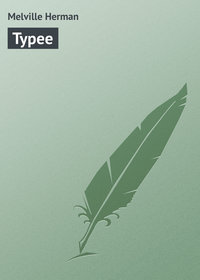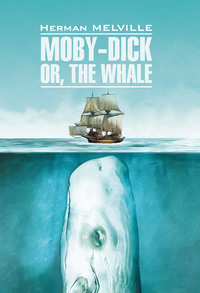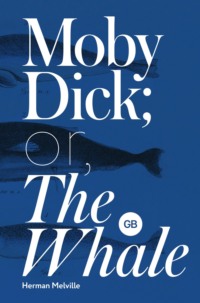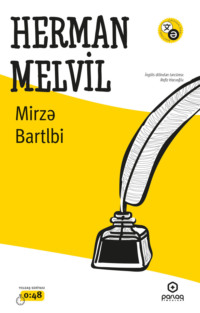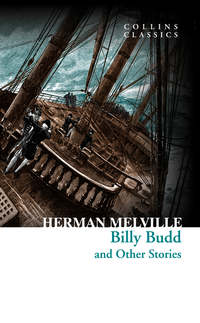
Полная версия
Moby Dick
So powerfully did the whole grim aspect of Ahab affect me, and the livid brand which streaked it, that for the first few moments I hardly noted that not a little of this overbearing grimness was owing to the barbaric white leg upon which he partly stood. It had previously come to me that this ivory leg had at sea been fashioned from the polished bone of the sperm-whale’s jaw. ‘Aye, he was dismasted off Japan,’ said the old Gay-Head Indian once; ‘but like his dismasted craft, he shipped another mast without coming home for it. He has a quiver of ’em.’
I was struck with the singular posture he maintained. Upon each side of the Pequod’s quarter-deck, and pretty close to the mizzen shrouds, there was an auger hole, bored about half an inch or so, into the plank. His bone leg steadied in that hole; one arm elevated, and holding by a shroud; Captain Ahab stood erect, looking straight out beyond the ship’s ever-pitching prow. There was an infinity of firmest fortitude, a determinate, unsurrenderable wilfulness, in the fixed and fearless, forward dedication of that glance. Not a word he spoke; nor did his officers say aught to him; though by all their minutest gestures and expressions, they plainly showed the uneasy, if not painful, consciousness of being under a troubled master-eye. And not only that, but moody stricken Ahab stood before them with a crucifixion in his face; in all the nameless regal overbearing dignity of some mighty woe.
Ere long, from his first visit in the air, he withdrew into his cabin. But after that morning, he was every day visible to the crew; either standing in his pivot-hole, or seated upon an ivory stool he had; or heavily walking the deck. As the sky grew less gloomy; indeed, began to grow a little genial, he became still less and less a recluse; as if, when the ship had sailed from home, nothing but the dead wintry bleakness of the sea had then kept him so secluded. And, by and by, it came to pass, that he was almost continually in the air; but, as yet, for all that he said, or perceptibly did, on the at last sunny deck, he seemed as unnecessary there as another mast. But the Pequod was only making a passage now; not regularly cruising; nearly all whaling preparatives needing supervision the mates were fully competent to, so that there was little or nothing, out of himself, to employ or excite Ahab, now; and thus chase away, for that one interval, the clouds that layer upon layer were piled upon his brow, as ever all clouds choose the loftiest peaks to pile themselves upon.
Nevertheless, ere long, the warm, warbling persuasiveness of the pleasant, holiday weather we came to, seemed gradually to charm him from his mood. For, as when the red-cheeked, dancing girls, April and May, trip home to the wintry, misanthropic woods; even the barest, ruggedest, most thunder-cloven old oak will at least send forth some few green sprouts, to welcome such glad-hearted visitants; so Ahab did, in the end, a little respond to the playful allurings of that girlish air. More than once did he put forth the faint blossom of a look, which, in any other man, would have soon flowered out in a smile.
CHAPTER 29
Enter Ahab; to Him, Stubb
Some days elapsed, and ice and icebergs all astern, the Pequod now went rolling through the bright Quito spring, which, at sea, almost perpetually reigns on the threshold of the eternal August of the Tropic. The warmly cool, clear, ringing, perfumed, overflowing, redundant days, were as crystal goblets of Persian sherbet, heaped up—flaked up, with rose-water snow. The starred and stately nights seemed haughty dames in jewelled velvets, nursing at home in lonely pride, the memory of their absent conquering Earls, the golden helmeted suns! For sleeping man, ’twas hard to choose between such winsome days and such seducing nights. But all the witcheries of that unwaning weather did not merely lend new spells and potencies to the outward world. Inward they turned upon the soul, especially when the still mild hours of eve came on; then, memory shot her crystals as the clear ice most forms of noiseless twilights. And all these subtle agencies, more and more they wrought on Ahab’s texture.
Old age is always wakeful; as if, the longer linked with life, the less man has to do with aught that looks like death. Among sea-commanders, the old greybeards will oftenest leave their berths to visit the night-cloaked deck. It was so with Ahab; only that now, of late, he seemed so much to live in the open air, that truly speaking, his visits were more to the cabin, than from the cabin to the planks. ‘It feels like going down into one’s tomb,’—he would mutter to himself,—‘for an old captain like me to be descending this narrow scuttle, to go to my grave-dug berth.’
So, almost every twenty-four hours, when the watches of the night were set, and the band on deck sentinelled the slumbers of the band below; and when if a rope was to be hauled upon the forecastle, the sailors flung it not rudely down, as by day, but with some cautiousness dropped it to its place, for fear of disturbing their slumbering shipmates; when this sort of steady quietude would begin to prevail, habitually, the silent steersman would watch the cabin-scuttle; and ere long the old man would emerge, griping at the iron banister, to help his crippled way. Some considerating touch of humanity was in him; for at times like these, he usually abstained from patrolling the quarter-deck; because to his wearied mates, seeking repose within six inches of his ivory heel, such would have been the reverberating crack and din of that bony step, that their dreams would have been of the crunching teeth of sharks. But once, the mood was on him too deep for common regardings; and as with heavy lumber-like pace he was measuring the ship from taffrail to main-mast, Stubb, the old second mate, came up from below, with a certain unassured, deprecating humorousness, hinted that if Captain Ahab was pleased to walk the planks, then, no one could say nay; but there might be some way of muffling the noise; hinting something indistinctly and hesitatingly about a globe of tow, and the insertion into it, of the ivory heel. Ah! Stubb, thou did’st not know Ahab then.
‘Am I a cannon-ball, Stubb,’ said Ahab, ‘that thou wouldst wad me that fashion? But go thy ways; I had forgot. Below to thy nightly grave; where such as ye sleep between shrouds, to use ye to the filling one at last.—Down, dog, and kennel!’
Starting at the unforeseen concluding exclamation of the so suddenly scornful old man, Stubb was speechless a moment; then said excitedly, ‘I am not used to be spoken to that way, sir; I do but less than half like it, sir.’
‘Avast!’ gritted Ahab between his set teeth, and violently moving away, as if to avoid some passionate temptation.
‘No, sir; not yet,’ said Stubb, emboldened, ‘I will not tamely be called a dog, sir.’
‘Then be called ten times a donkey, and a mule, and an ass, and begone, or I’ll clear the world of thee!’
As he said this, Ahab advanced upon him with such overbearing terrors in his aspect, that Stubb involuntarily retreated.
‘I was never served, so before without giving a hard blow for it,’ muttered Stubb, as he found himself descending the cabin-scuttle. ‘It’s very queer. Stop, Stubb; somehow, now, I don’t well know whether to go back and strike him, or—what’s that?—down here on my knees and pray for him? Yes, that was the thought coming up in me; but it would be the first time I ever did pray. It’s queer; very queer; and he’s queer too; aye, take him fore and aft, he’s about the queerest old man Stubb ever sailed with. How he flashed at me!—his eyes like powderpans! is he mad? Anyway there’s something on his mind, as sure as there must be something on a deck when it cracks. He ain’t in his bed now, either, more than three hours out of the twenty-four; and he don’t sleep then. Didn’t that Dough-Boy, the steward, tell me that of a morning he always finds the old man’s hammock clothes all rumpled and tumbled, and the sheets down at the foot, and the coverlid almost tied into knots, and the pillow a sort of frightful hot, as though a baked brick had been on it? A hot old man! I guess he’s got what some folks ashore call a conscience; it’s a kind of Tic-Dolly-row they say—worse nor a toothache. Well, well; I don’t know what it is, but the Lord keep me from catching it. He’s full of riddles; I wonder what he goes into the after hold for, every night, as Dough-Boy tells me he suspects; what’s that for, I should like to know? Who’s made appointments with him in the hold? Ain’t that queer, now? But there’s no telling, it’s the old game—Here goes for a snooze. Damn me, it’s worth a fellow’s while to be born into the world, if only to fall right asleep. And now that I think of it, that’s about the first thing babies do, and that’s a sort of queer, too. Damn me, but all things are queer, come to think of ’em. But that’s against my principles. Think not, is my eleventh commandment; and sleep when you can, is my twelfth—So here goes again. But how’s that? didn’t he call me a dog? blazes! he called me ten times a donkey, and piled a lot of jackasses on top of that! He might as well have kicked me, and done with it. Maybe he did kick me, and I didn’t observe it, I was so taken all aback with his brow, somehow. It flashed like a bleached bone. What the devil’s the matter with me? I don’t stand right on my legs. Coming afoul of that old man has a sort of turned me wrong side out. By the Lord, I must have been dreaming, though—How? how? how?—but the only way’s to stash it; so here goes to hammock again; and in the morning, I’ll see how this plaguey juggling thinks over by daylight.’
CHAPTER 30
The Pipe
When stubb had departed, Ahab stood for a while leaning over the bulwarks; and then, as had been usual with him of late, calling a sailor of the watch, he sent him below for his ivory stool, and also his pipe. Lighting the pipe at the binnacle lamp and planting the stool on the weather side of the deck, he sat and smoked.
In old Norse times, the thrones of the sea-loving Danish kings were fabricated, saith tradition, of the tusks of the narwhale. How could one look at Ahab then, seated on that tripod of bones, without bethinking him of the royalty it symbolized? For a Khan of the plank, and a king of the sea, and a great lord of Leviathans was Ahab.
Some moments passed, during which the thick vapour came from his mouth in quick and constant puffs, which blew back again into his face. ‘How now,’ he soliloquized at last, withdrawing the tube, ‘this smoking no longer soothes. Oh, my pipe! hard must it go with me if thy charm be gone! Here have I been unconsciously toiling, not pleasuring,—aye, and ignorantly smoking to windward all the while; to windward, and with such nervous whiffs, as if, like the dying whale, my final jets were the strongest and fullest of trouble. What business have I with this pipe? This thing that is meant for sereneness, to send up mild white vapours among mild white hairs, not among torn iron-grey locks like mine. I’ll smoke no more—’
He tossed the still lighted pipe into the sea. The fire hissed in the waves; the same instant the ship shot by the bubble the sinking pipe made. With slouched hat, Ahab lurchingly paced the planks.
CHAPTER 31
Queen Mab
Next morning Stubb accosted Flask.
‘Such a queer dream, King-Post, I never had. You know the old man’s ivory leg, well I dreamed he kicked me with it; and when I tried to kick back, upon my soul, my little man, I kicked my leg right off! And then, presto! Ahab seemed a pyramid, and I, like a blazing fool, kept kicking at it. But what was still more curious, Flask—you know how curious all dreams are—through all this rage that I was in, I somehow seemed to be thinking to myself, that after all, it was not much of an insult, that kick from Ahab. “Why,” thinks I, “what’s the row? It’s not a real leg, only a false one.” And there’s a mighty difference between a living thump and a dead thump. That’s what makes a blow from the hand, Flask, fifty times more savage to bear than a blow from a cane. The living member—that makes the living insult, my little man. And thinks I to myself all the while, mind, while I was stubbing my silly toes against that cursed pyramid—so confoundedly contradictory was it all, all the while, I say, I was thinking to myself, “what’s his leg now, but a cane—a whalebone cane. Yes,” thinks I, “it was only a playful cudgelling—in fact, only a whaleboning that he gave me—not a base kick. Besides,” thinks I, “look at it once; why, the end of it—the foot part—what a small sort of end it is; whereas, if a broad-footed farmer kicked me, there’s a devilish broad insult. But this insult is whittled down to a point only.” But now comes the greatest joke of the dream, Flask. While I was battering away at the pyramid, a sort of badger-haired old merman, with a hump on his back, takes me by the shoulders, and slews me round. “What are you ‘bout?” says he. Slid! man, but I was frightened. Such a phiz! But, somehow, next moment I was over the fright. “What am I about?” says I at last. “And what business is that of yours, I should like to know, Mr. Humpback? Do you want a kick?” By the lord, Flask, I had no sooner said that, than he turned round his stern to me, bent over, and dragging up a lot of seaweed he had for a clout—what do you think, I saw?—why thunder alive, man, his stern was stuck full of marlin-spikes, with the points out. Says I, on second thoughts, “I guess I won’t kick you, old fellow.”—“Wise Stubb,” said he, “wise Stubb”; and kept muttering it all the time, a sort of eating of his own gums like a chimney hag. Seeing he wasn’t going to stop saying over his “wise Stubb, wise Stubb,” I thought I might as well fall to kicking the pyramid again. But I had only just lifted my foot for it, when he roared out, “Stop that kicking!”—“Halloa,” says I, “what’s the matter now, old fellow?”—“Look ye here,” says he; “let’s argue the insult. Captain Ahab kicked ye, didn’t he?”—“Yes, he did,” says I—“right here it was,”—“Very good,” says he—“he used his ivory leg, didn’t he?”—“Yes, he did,” says I. “Well then,” says he, “wise Stubb, what have you to complain of? Didn’t he kick with right good will? it wasn’t a common pitch-pine leg he kicked with, was it? No, you were kicked by a great man, and with a beautiful ivory leg, Stubb. It’s an honour; I consider it an honour. Listen, wise Stubb. In old England the greatest lords think it great glory to be slapped by a queen, and made garter-knights of; but, be your boast, Stubb, that ye were kicked by old Ahab, and made a wise man of. Remember what I say; be kicked by him; account his kicks honours; and on no account kick back; for you can’t help yourself, wise Stubb. Don’t you see that pyramid?” With that, he all of a sudden seemed somehow, in some queer fashion, to swim off into the air. I snored; rolled over; and there I was in my hammock! Now, what do you think of that dream, Flask?’
‘I don’t know; it seems a sort of foolish to me, tho’.’
‘May be; may be. But it’s made a wise man of me, Flask. D’ye see Ahab standing there, sideways looking over the stern? Well, the best thing you can do, Flask, is to let that old man alone; never speak to him, whatever he says. Halloa! What’s that he shouts? Hark!’
‘Mast-head, there! Look sharp, all of ye! There are whales hereabouts! If ye see a white one, split your lungs for him!’
‘What do you think of that now, Flask? ain’t there a small drop of something queer about that, eh? A white whale—did ye mark that, man? Look ye—there’s something special in the wind. Stand by for it, Flask. Ahab has that that’s bloody on his mind. But, mum; he comes this way.’
CHAPTER 32
Cetology
Already we are boldly launched upon the deep; but soon we shall be lost in its unshored, harbourless immensities. Ere that come to pass; ere the Pequod’s weedy hull rolls side by side with the barnacled hulls of the Leviathan; at the outset it is but well to attend to a matter almost indispensable to a thorough appreciative understanding of the more special Leviathanic revelations and allusions of all sorts which are to follow.
It is some systematized exhibition of the whale in his broad genera, that I would now fain put before you. Yet is it no easy task. The classification of the constituents of a chaos, nothing less is here essayed. Listen to what the best and latest authorities have laid down.
‘No branch of Zoology is so much involved as that which is entitled Cetology,’ says Captain Scoresby, A.D. 1820.
‘It is not my intention, were it in my power, to enter into the inquiry as to the true method of dividing the cetacea into groups and families.* * * Utter confusion exists among the historians of this animal’ (sperm whale), says Surgeon Beale, A.D. 1839.
‘Unfitness to pursue our research in the unfathomable waters.’—‘Impenetrable veil covering our knowledge of the cetacea.’—‘A field strewn with thorns.’—‘All these incomplete indications but serve to torture us naturalists.’
Thus speak of the whale, the great Cuvier, and John Hunter, and Lesson, those lights of zoology and anatomy. Nevertheless, though of real knowledge there be little, yet of books there are a plenty; and so in some small degree, with cetology, or the science of whales. Many are the men, small and great, old and new, landsmen and seamen, who have at large or in little, written of the whale. Run over a few: The Authors of the Bible; Aristotle; Pliny; Aldrovandi; Sir Thomas Browne; Gesner; Ray; Linnaeus; Rondeletius; Willoughby; Green; Artedi; Sibbald; Brisson; Marten; Lacépède; Bonneterre; Desmarest; Baron Cuvier; Frederick Cuvier; John Hunter; Owen; Scoresby; Beale; Bennett; J. Ross Browne; the Author of Miriam Coffin; Olmstead; and the Rev. T. Cheever. But to what ultimate generalizing purpose all these have written, the above cited extracts will show.
Of the names in this list of whale authors, only those following Owen ever saw living whales; and but one of them was a real professional harpooneer and whaleman. I mean Captain Scoresby. On the separate subject of the Greenland or Right whale, he is the best existing authority. But Scoresby knew nothing and says nothing of the great sperm-whale, compared with which the Greenland whale is almost unworthy mentioning. And here be it said, that the Greenland whale is an usurper upon the throne of the seas. He is not even by any means the largest of the whales. Yet, owing to the long priority of his claims, and the profound ignorance which, till some seventy years back, invested the then fabulous or utterly unknown sperm-whale, and which ignorance to this present day still reigns in all but some few scientific retreats and whale-ports; this usurpation has been every way complete. Reference to nearly all the Leviathanic allusions in the great poets of past days, will satisfy you that the Greenland whale, without one rival, was to them the monarch of the seas. But the time has come for a new proclamation. This is Charing Cross; hear ye! good people all,—the Greenland whale is deposed,—the great sperm-whale now reigneth!
There are only two books in being which at all pretend to put the living sperm-whale before you, and at the same time, in the remotest degree succeed in the attempt. Those books are Beale’s and Bennett’s; both in their time surgeons to the English South-Sea whale-ships, and both exact and reliable men. The original matter touching the sperm-whale to be found in their volumes is necessarily small; but so far as it goes, it is of excellent quality, though mostly confined to scientific description. As yet, however, the sperm-whale, scientific or poetic, lives not complete in any literature. Far above all other hunted whales, his is an unwritten life.
Now the various species of whales need some sort of popular comprehensive classification, if only an easy outline one for the present, hereafter to be filled in all its departments by subsequent labourers. As no better man advances to take this matter in hand, I hereupon offer my own poor endeavours. I promise nothing complete; because any human thing supposed to be complete, must for that very reason infallibly be faulty. I shall not pretend to a minute anatomical description of the various species, or—in this place at least—to much of any description. My object here is simply to project the draught of a systematization of cetology. I am the architect, not the builder.
But it is a ponderous task; no ordinary letter-sorter in the post-office is equal to it. To grope down into the bottom of the sea after them; to have one’s hand among the unspeakable foundations, ribs, and very pelvis of the world; this is a fearful thing. What am I that I should essay to hook the nose of this Leviathan! The awful tauntings in Job might well appal me. ‘Will he (the Leviathan) make a covenant with thee? Behold the hope of him is vain!’ But I have swam through libraries and sailed through oceans; I have had to do with whales with these visible hands; I am in earnest; and I will try. There are some preliminaries to settle.
First: The uncertain, unsettled condition of this science of Cetology is in the very vestibule attested by the fact, that in some quarters it still remains a moot point whether a whale be a fish. In his System of Nature, A.D. 1776, Linnaeus declares, ‘I hereby separate the whales from the fish.’ But to my own knowledge, I know that down to the year 1850, sharks and shad, alewives and herring, against Linnaeus’s express edict, were still found dividing the possession of the same seas with the Leviathan.
The grounds upon which Linnaeus would fain have banished the whales from the waters, he states as follows: ‘On account of their warm bilocular heart, their lungs, their movable eyelids, their hollow ears, penem intrantem feminam mammis lactantem,’ and finally, ‘ex lege naturae jure meritoque.’ I submitted all this to my friends Simeon Macey and Charley Coffin, of Nantucket, both messmates of mine in a certain voyage, and they united in the opinion that the reasons set forth were altogether insufficient. Charley profanely hinted they were humbug.
Be it known that, waiving all argument, I take the good old-fashioned ground that the whale is a fish, and call upon holy Jonah to back me. This fundamental thing settled, the next point is, in what internal respect does the whale differ from other fish. Above, Linnaeus has given you those items. But in brief, they are these: lungs and warm blood; whereas, all other fish are lungless and cold-blooded.
Next: how shall we define the whale, by his obvious externals, so as conspicuously to label him for all time to come? To be short, then, a whale is a spouting fish with a horizontal tail. There you have him. However contracted, that definition is the result of expanded meditation. A walrus spouts much like a whale, but the walrus is not a fish, because he is amphibious. But the last term of the definition is still more cogent, as coupled with the first. Almost any one must have noticed that all the fish familiar to landsmen have not a flat, but a vertical, or up and down tail. Whereas, among spouting fish the tail, though it may be similarly shaped, invariably assumes a horizontal position.
By the above definition of what a whale is, I do by no means exclude from the Leviathanic brotherhood any sea creature hitherto identified with the whale by the best informed Nantucketers; nor, on the other hand, link with it any fish hitherto authoritatively regarded as alien.2 Hence, all the smaller, spouting, and horizontal tailed fish must be included in this ground-plan of Cetology. Now, then, come the grand divisions of the entire whale host.
First: According to magnitude I divide the whales into three primary BOOKS (subdivisible into Chapters), and these shall comprehend them all, both small and large.
I. The Folio whale; II. the Octavo whale; III. the Duodecimo whale.
As to the type of the Folio, I present the Sperm whale; of the Octavo, the Grampus; of the Duodecimo, the Porpoise.


